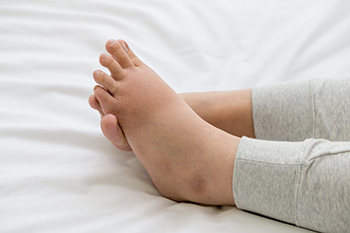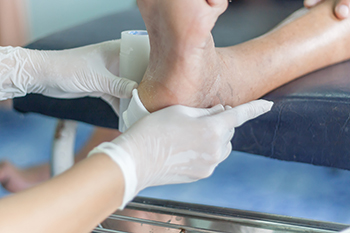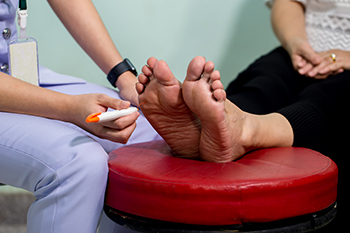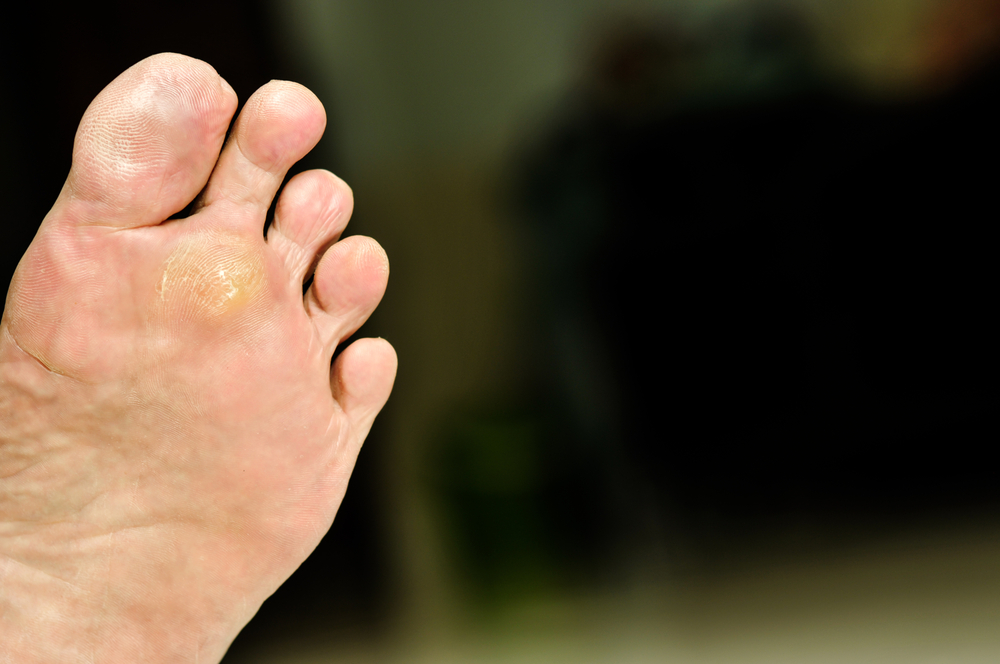Items filtered by date: June 2023
Sore and Swollen Feet During Pregnancy

Many women experience discomfort during their pregnancy, and their feet are often affected. Foot pain and swelling often happen in the second or third trimester, making it difficult to complete daily tasks. The noticeable weight gain may cause plantar fasciitis to develop, as a result of the extra weight the heel and arches have to bear. This is a condition that targets the plantar fascia and causes it to become torn or inflamed. Edema is the medical term for swollen feet and is common among pregnant women. It happens from the extra fluids that the body naturally produces to support the growing fetus, and may pool in the feet and ankles. Foot pain may be managed by performing daily stretches which can help to increase blood flow and diminish soreness. Swollen feet may be helped by reducing sodium intake, and drinking plenty of water daily. If your pregnancy causes you to have foot pain or swollen feet, it is suggested that you speak to a podiatrist who can offer you additional relief options.
Pregnant women with swollen feet can be treated with a variety of different methods that are readily available. For more information about other cures for swollen feet during pregnancy, consult with Edward Gonzalez, DPM from Lower Extremity Care. Our doctor will attend to all of your foot and ankle needs.
What Foot Problems Can Arise During Pregnancy?
One problem that can occur is overpronation, which occurs when the arch of the foot flattens and tends to roll inward. This can cause pain and discomfort in your heels while you’re walking or even just standing up, trying to support your baby.
Another problem is edema, or swelling in the extremities. This often affects the feet during pregnancy but tends to occur in the later stages.
How Can I Keep My Feet Healthy During Pregnancy?
- Wearing orthotics can provide extra support for the feet and help distribute weight evenly
- Minimize the amount of time spent walking barefoot
- Wear shoes with good arch support
- Wear shoes that allow for good circulation to the feet
- Elevate feet if you experience swelling
- Massage your feet
- Get regular, light exercise, such as walking, to promote blood circulation to the feet
If you have any questions please feel free to contact our office located in Miami, FL . We offer the newest diagnostic and treatment technologies for all your foot and ankle needs.
When to See a Podiatrist for Wound Care

As the summer months begin, the risks of cutting or otherwise wounding your feet may increase. Wearing sandals or flip flops, as well as going barefoot more often can increase the chances of having to deal with foot wounds. If you are bleeding profusely from a wound, immediate medical attention is vital. There also may be times when a podiatrist is needed to attend to foot wounds, including punctures, lacerations, toenail injuries, and broken toes. When you step on a nail or other sharp object, the puncture wound may appear small and may not bleed very much. But because the depth of the wound can be a source of infection as well as damage to nerves and tendons, attention from this foot doctor is suggested. Abrasions or scrapes may bleed and ooze fluids, making it difficult to clear it from debris. To avoid infection setting in, it is suggested that you make an appointment with a podiatrist. Similarly, if you have a skin injury and have diabetes or vascular disease, seeing a podiatrist as soon as possible is strongly suggested.
Wound care is an important part in dealing with diabetes. If you have diabetes and a foot wound or would like more information about wound care for diabetics, consult with Edward Gonzalez, DPM from Lower Extremity Care. Our doctor will assess your condition and provide you with quality foot and ankle treatment.
What Is Wound Care?
Wound care is the practice of taking proper care of a wound. This can range from the smallest to the largest of wounds. While everyone can benefit from proper wound care, it is much more important for diabetics. Diabetics often suffer from poor blood circulation which causes wounds to heal much slower than they would in a non-diabetic.
What Is the Importance of Wound Care?
While it may not seem apparent with small ulcers on the foot, for diabetics, any size ulcer can become infected. Diabetics often also suffer from neuropathy, or nerve loss. This means they might not even feel when they have an ulcer on their foot. If the wound becomes severely infected, amputation may be necessary. Therefore, it is of the upmost importance to properly care for any and all foot wounds.
How to Care for Wounds
The best way to care for foot wounds is to prevent them. For diabetics, this means daily inspections of the feet for any signs of abnormalities or ulcers. It is also recommended to see a podiatrist several times a year for a foot inspection. If you do have an ulcer, run the wound under water to clear dirt from the wound; then apply antibiotic ointment to the wound and cover with a bandage. Bandages should be changed daily and keeping pressure off the wound is smart. It is advised to see a podiatrist, who can keep an eye on it.
If you have any questions, please feel free to contact our office located in Miami, FL . We offer the newest diagnostic and treatment technologies for all your foot care needs.
Diabetic Patients and Neuropathy

Neuropathy affects the nerves throughout the body, including the feet, and it can cause the inability to feel pain in the soles of the feet. Many people who have this condition are unable to feel if their feet are hot or cold, and they may have a consistent tingling or numbing sensation. People who are diabetic can develop neuropathy which can lead to serious consequences as wounds can develop on the bottom of the feet that are not noticed. Untreated wounds in these patients may lead to getting foot ulcers, and it is imperative the bottom of the feet are checked daily. Patients who are afflicted with neuropathy may have difficulty walking, balance may be affected, and it may possibly lead to falling. If you have this condition, it is strongly suggested that you are under the care of a podiatrist who can guide you toward proper management techniques.
Neuropathy
Neuropathy can be a potentially serious condition, especially if it is left undiagnosed. If you have any concerns that you may be experiencing nerve loss in your feet, consult with Edward Gonzalez, DPM from Lower Extremity Care. Our doctor will assess your condition and provide you with quality foot and ankle treatment for neuropathy.
What Is Neuropathy?
Neuropathy is a condition that leads to damage to the nerves in the body. Peripheral neuropathy, or neuropathy that affects your peripheral nervous system, usually occurs in the feet. Neuropathy can be triggered by a number of different causes. Such causes include diabetes, infections, cancers, disorders, and toxic substances.
Symptoms of Neuropathy Include:
- Numbness
- Sensation loss
- Prickling and tingling sensations
- Throbbing, freezing, burning pains
- Muscle weakness
Those with diabetes are at serious risk due to being unable to feel an ulcer on their feet. Diabetics usually also suffer from poor blood circulation. This can lead to the wound not healing, infections occurring, and the limb may have to be amputated.
Treatment
To treat neuropathy in the foot, podiatrists will first diagnose the cause of the neuropathy. Figuring out the underlying cause of the neuropathy will allow the podiatrist to prescribe the best treatment, whether it be caused by diabetes, toxic substance exposure, infection, etc. If the nerve has not died, then it’s possible that sensation may be able to return to the foot.
Pain medication may be issued for pain. Electrical nerve stimulation can be used to stimulate nerves. If the neuropathy is caused from pressure on the nerves, then surgery may be necessary.
If you have any questions, please feel free to contact our office located in Miami, FL . We offer the newest diagnostic and treatment technologies for all your foot care needs.
Who Can Get Plantar Warts?

Plantar warts are essentially growths that can form on the soles of the feet due to contracting the human papillomavirus. Many patients who are trying to prevent the onset of plantar warts will ask podiatrists who can get plantar warts. The answer is that ultimately anyone can develop a plantar wart. However, certain types of people are more susceptible than others. For example, children attending school may be more susceptible than adults to developing plantar warts. Additionally, individuals living with weakened immune systems could be especially prone to developing plantar warts. This might include people with HIV and those on chemotherapy. If you are living with plantar warts, it is suggested that you schedule an appointment with a podiatrist today for treatment options.
Plantar warts can be very uncomfortable. If you need your feet checked, contact Edward Gonzalez, DPM from Lower Extremity Care. Our doctor will assist you with all of your foot and ankle needs.
About Plantar Warts
Plantar warts are the result of HPV, or human papillomavirus, getting into open wounds on the feet. They are mostly found on the heels or balls of the feet.
While plantar warts are generally harmless, those experiencing excessive pain or those suffering from diabetes or a compromised immune system require immediate medical care. Plantar warts are easily diagnosed, usually through scraping off a bit of rough skin or by getting a biopsy.
Symptoms
- Lesions on the bottom of your feet, usually rough and grainy
- Hard or thick callused spots
- Wart seeds, which are small clotted blood vessels that look like little black spots
- Pain, discomfort, or tenderness of your feet when walking or standing
Treatment
- Freezing
- Electric tool removal
- Laser Treatment
- Topical Creams (prescription only)
- Over-the-counter medications
To help prevent developing plantar warts, avoid walking barefoot over abrasive surfaces that can cause cuts or wounds for HPV to get into. Avoiding direct contact with other warts, as well as not picking or rubbing existing warts, can help prevent the further spread of plantar warts. However, if you think you have developed plantar warts, speak to your podiatrist. He or she can diagnose the warts on your feet and recommend the appropriate treatment options.
If you have any questions please feel free to contact our office located in Miami, FL . We offer the newest diagnostic and treatment technologies for all your foot and ankle needs.

